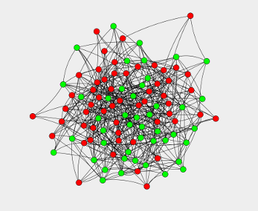Separation of timescales in models of complex networks
- Started
- 9th February 2011
- Research Team
- Elisabeth zu-Erbach-Schoenberg, Connor McCabe
- Investigators
- Seth Bullock
The state of a real-world system is often influenced by several processes which might operate on different timescales. These timescales can coincide closely or be separated by several orders of magnitude. The way timescales are related has important implications for the system's behaviour and consequently for modelling the system's behaviour. Systems with processes having well-separated timescales can often be modelled by assuming one process is instantaneous if it is much faster than the other processes (and therefore does not have to be modelled as a process). On the other hand, if one process is much slower than the others, then we can abstract its effects as a parameter.
The aim of this project is to review how modellers have dealt with the problem of modelling processes with different timescales in the past and to demonstrate that the way the timescales of two processes are related can have a significant influence on the system behaviour. We investigate this using a simple model of a dynamical network where network state and topology are changing over time.
Categories
Socio-technological System simulation: Social and Socio-economic Systems, Social Networks
Algorithms and computational methods: Agents
Visualisation and data handling software: Gnuplot, Jung
Software Engineering Tools: Eclipse, SVN
Programming languages and libraries: Java
Computational platforms: Linux
Transdisciplinary tags: Complex Systems
